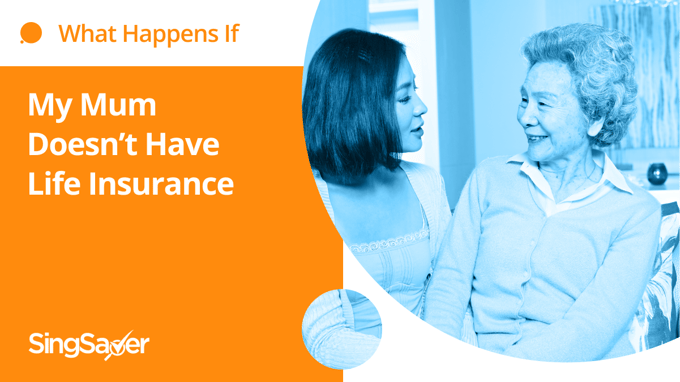It’s Mother’s Day, and it’s the perfect opportunity to show our mums how much we love them. Sure, throwing them a party or cooking them a simple meal is great, but have you thought about giving your mum a gift that will literally last her whole life?
If you're considering life insurance, let's break down the policy for seniors – why it’s important, and what to look for when getting it for your mum (and/or your dad).
Understanding life insurance
At its most basic, a life insurance policy provides a lump-sum payout when the insured person passes away, or experiences total and permanent disability (TPD). This is the core premise of a life insurance policy aside from certain exceptions like death by suicide within a specific timeframe.
A basic life policy can be boosted with other benefits under specific circumstances, and these come in the form of riders. Some common and popular riders include benefits for critical illnesses or personal accidents.
In fact, a life policy can act as an all-in-one insurance plan for virtually any situation, provided the relevant riders are attached.
While this flexibility is useful, it can also make it difficult to understand what a life insurance plan actually does, and whether you should get a policy for your mum.
Compare the best term life insurance plans on our site. Get S$1 million coverage for just S$1.49 a day!
Life insurance plans for older Singaporeans
Basically, there are only two types of life insurance plans to choose from – term life or whole life. Let’s list out the main differences between the two.
| Insurance | Description |
| Term life insurance | Covers up to a specific age only Does not build cash value Lower premiums |
| Whole life insurance | Covers whole of life Builds cash value Higher premiums |
Term life insurance
Term life is a life insurance type that covers death and TPD for a specified period of time (either a certain number of years or up to a certain age). There are term life plans that cover up to age 99 or even 100, which makes these quite similar to a whole life plan.
However, a term life policy offers pure protection; it does not accrue cash value. Thus, there is no forthcoming payout when the plan ends.
If your term life plan coverage is only valid up to age 80, then you won’t receive anything once you outlive that age. But, as mentioned, this can be easily avoided by opting for a term life plan with a longer term coverage.
Since term life only offers insurance protection, the premiums are much lower than whole life plans. With term life, you only need to pay for the costs of insurance.
Compare the best term life insurance plans on our site. Get S$1 million coverage for just S$1.49 a day!
Whole life insurance
Whole life insurance covers against death and TPD throughout the natural lifespan of the insured. This type of plan terminates when the benefits have been paid out or when the policy lapses.
Unlike term life, whole life’s policy builds up cash value over time. A portion of your premiums are set aside to accumulate wealth. Hence, there is a higher likelihood of collecting the death benefit, as there is no risk of outliving the policy.
Moreover, there is also potential for the cash value to exceed the sum assured for a larger payout for beneficiaries.
The drawback of whole life insurance is that it has a much higher premium compared to term life insurance. Then again, once your policy builds up sufficient cash value, you can tap on those funds through a policy loan to meet other financial needs.
Why life insurance is useful during old age
In the interest of clarity, we will be breaking down life insurance at its most basic – a plan that only covers death and TPD.
Here are a few reasons why even the most basic life insurance plan is useful during old age.
It covers final expenses
The lump-sum payout of a life insurance plan can be put to immediate needs such as the final expenses of the deceased.
These commonly include funeral, last rites, burial plots, columbarium fees, as well as the costs of engaging a professional executor of wills (if required).

Looking for an affordable Integrated Shield Plan (IP)? Singlife Shield Starter* covers you with up to S$20,000 per policy year for hospital bills at just S$300 (before GST) fully payable by MediSave — great for young adults who want basic. For more coverage, add on the rider, Singlife Health Plus Starter, at just S$1 (before GST) and reduce co-payment of your hospital bills to just 5%!
*T&Cs apply. This product is underwritten by Singapore Life Ltd. SingSaver is not an insurance agent/intermediary and cannot solicit any insurance business, give advice, recommend any product or arrange any insurance contract. Please direct all enquiries to Singapore Life Ltd. This advertisement has not been reviewed by the Monetary Authority of Singapore.
It pays off outstanding debt
This plan can cover any of the deceased’s outstanding debt, including various loans, medical bills, and even credit card balances.
Under Singapore’s legal framework, surviving family members cannot inherit debt, but inheritors are consequently affected when the deceased’s estate is used to settle them.
A life insurance policy may prevent this by paying off debt obligations, with the remainder added to the inheritance available to surviving loved ones.
It boosts retirement income (for surviving spouse)
If half of a senior couple passes away, the surviving spouse may face a dimmer financial outlook, especially if they were dependent on the deceased. The financial responsibility could then fall on the shoulders of the children.
Having a life insurance policy can help families avoid this by increasing the retirement income available to the surviving spouse. This ensures that their needs are still taken care of.
What about Careshield Life?
At this point, some of you may be wondering about Careshield Life and how it factors into the equation. So, let’s take a look at what it does and how it works.
What is Careshield Life?
In case you didn’t know, Careshield Life is a national insurance programme that covers disability. It is an evolution of the preceding ElderShield plan, and covers all eligible Singaporeans born from 1970 onwards.
There is a good chance your parents may still be covered under ElderShield instead of Careshield Life. Nonetheless, both plans offer the same type of coverage.
How does Careshield Life/ElderShield work?
Careshield Life/ElderShield provides a monthly income for those afflicted with a severe disability, which is defined as being unable to perform at least three out of six Activities of Daily Living (ADLs).
Here are the considered ADLs:
- Washing
- Toileting
- Feeding
- Dressing
- Walking or moving around
- Transferring (from a bed to an upright chair or wheelchair, and vice versa)
This is especially useful because someone in this state of disability may require round-the-clock care and special equipment such as walkers or wheelchairs. Modifications to the home like adding grab bars and special toilets may also be required.
That said, having a severe disability can be financially strenuous, which is why disability income is crucial.
In case of such risks, Careshield Life payouts can be boosted with a Careshield Life supplement from a private insurer.
Why CareshieldLife/ElderShield may not be a replacement for life insurance
Simply put, Careshield Life/ElderShield and life insurance cover totally different needs. Careshield Life/ElderShield pays an income to alleviate the costs of disability, and this ends when certain conditions are met (i.e. reaching a certain age, the demise of the insured).
Disability income plans do not offer lump-sum payouts upon death. Hence, it cannot cover final expenses, pay outstanding debt, or boost the retirement income of the surviving spouse.
Should you get your mum a life insurance plan?
The decision to purchase a life insurance plan should not be taken lightly as it is a long-term commitment that requires financial stability. Failing to pay premiums will result in the loss of your life policy and a high likelihood of financial damages.
Hence, it’s important to thoroughly discuss with your family members before making any big financial decisions for your parents’ benefits. Things to consider are your budget, level of protection required, riders to add, and your payment plan.
Having a payment plan is very important because the premiums for life insurance dramatically ramp up as old age approaches.
In any case, good on you for considering protection for your mum and your family in a way that matters.
Looking for an affordable entry-level Integrated Shield Plan (IP)? Singlife Shield Starter covers you up to S$20,000 per year for hospitalisation and day surgeries. For more coverage, add on the rider, Singlife Health Plus Starter, at just S$1 and your co-payment will be reduced to just 5%!

Looking for an affordable Integrated Shield Plan (IP)? Singlife Shield Starter* covers you with up to S$20,000 per policy year for hospital bills at just S$300 (before GST) fully payable by MediSave — great for young adults who want basic. For more coverage, add on the rider, Singlife Health Plus Starter, at just S$1 (before GST) and reduce co-payment of your hospital bills to just 5%!
*T&Cs apply. This product is underwritten by Singapore Life Ltd. SingSaver is not an insurance agent/intermediary and cannot solicit any insurance business, give advice, recommend any product or arrange any insurance contract. Please direct all enquiries to Singapore Life Ltd. This advertisement has not been reviewed by the Monetary Authority of Singapore.
Read these next:
Are ElderShield Plans Good for Your Ageing Parents?
Best CareShield Life Supplement Plans in Singapore (2022)
Whole Life Insurance: Reasons Why People Choose It Over Term Life
Term Insurance vs Life Insurance – Which One Is Right for You?
Similar articles
Personal Accident vs Life & Medical Insurance: What You Need to Know
5 Misconceptions Singaporeans Have About Disability Insurance
Does Every Singaporean Need Disability Income Insurance?
China Taiping Insurance (Singapore) Life Insurance Review (2022)
CareShield Life And MediSave Care: Everything You Need To Know
Dependants’ Protection Scheme Guide – Criteria, Coverage, Premiums And Claims
Best CareShield Life Supplement Plans In Singapore (2024)
Great Family Care Review: A Multi-Generational Critical Illness Plan for the Whole Family










